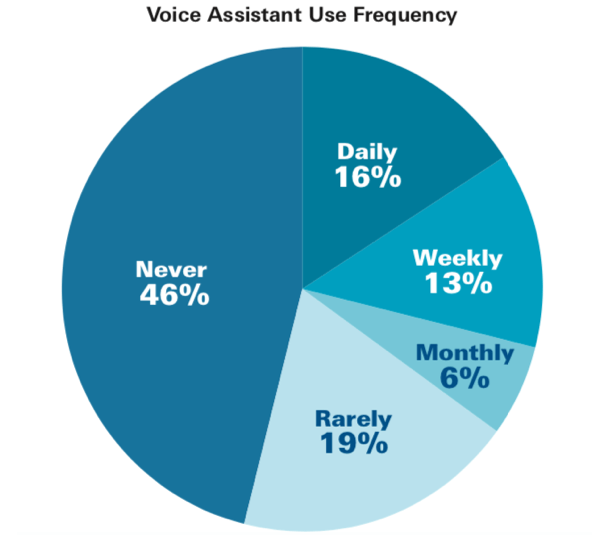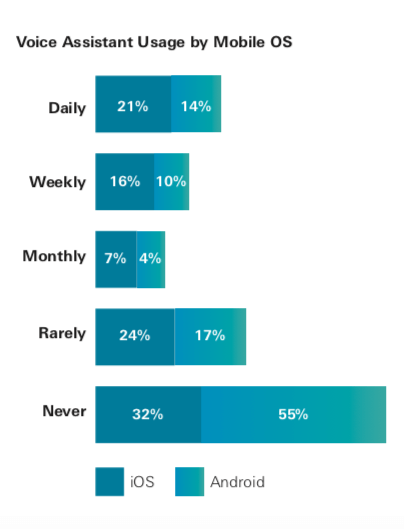Is voice over-hyped? A new survey suggests lower adoption than previously thought
iPhones dominate usage, despite aggressive promotion of the Google Assistant.
A popular Bill Gates quotation reads, “Most people overestimate what they can do in one year and underestimate what they can do in ten years.” That’s often invoked to suggest new technologies don’t change things as quickly as expected but will have a longer-term impact. Such is the case with voice and virtual assistants.
A decade ago we used to say “search is the universal interface.” Slowly, voice is supplanting it — emphasis on the word slowly. Despite the hype around voice and virtual assistants, which I have contributed to, adoption is seemingly not happening as quickly as expected. A new report from SUMO Heavy underscores this idea.
About 30% are active users. The survey of just over 1,000 U.S. adults found that nearly half (46%) of respondents never use virtual assistants, emphasis on “never.” Another group (19%) use virtual assistants “rarely” (less than monthly). These are effectively non-users. Together these two groups represent 65% of the audience, while 29% (daily and weekly) is the active user base.
Source: SUMO Heavy, n=1,046 (4/19)
An earlier consumer survey from Uberall (April, 2019) discovered that 52% of respondents “never” use voice search. This is consistent with the SUMO Heavy findings.
Majority of usage happening on smartphones. It comes as no surprise that the bulk of voice usage is happening on smartphones, which have the most distribution of the various devices that feature virtual assistants. It’s interesting to note, in the graphic below, that there’s a fair amount of usage on the desktop (15%), which may be Cortana on Windows PCs, as well as in-car systems (11%).
Because virtual assistants are the defining feature of smart speakers, the 18% usage figure below is equivalent to device ownership. This would suggest a significantly lower smart speaker penetration rate (~46 million) in the U.S. than other surveys.
Device of choice for virtual assistant usage
Source: SUMO Heavy, n=1,046 (4/19)
iPhones outpacing Android. Perhaps the biggest surprise of the survey is the operating system data. Google has been promoting Google Assistant very heavily for both smartphones and its smart speakers and displays with national media campaigns. However the SUMO Heavy findings show much more usage of virtual assistants on iPhones.
Overall there are more active users on iOS than Android (44% vs. 28%) and there are many more “rarely” and “never” respondents on Android (72%). This may be a result of Android vs. iPhone demographics and the fact that there are a lot of low-end Android phones in market. But it’s still very surprising.
Source: SUMO Heavy, n=1,046 (4/19)
Finally the survey explored voice shopping with virtual assistants. It found that 17% had “browsed or shopped products using a voice-activated assistant.” However, among the weekly or daily users, 42% said that they had shopped using a virtual assistant. This supports the notion that there’s very little “v-commerce” happening yet.
Why we should care. This is just one survey; however it argues that we temper our voice-search mania. Voice and virtual assistants as a kind of “universal UI” are here to stay. These are important technologies that are changing and will continue to change the way that people interact with devices. However, it’s not happening as quickly as many had anticipated — half the audience is composed of non-users. The other half is using these technologies but not uniformly.
If we accept the SUMO Heavy findings, a little less than a third of the installed base are active users of voice and virtual-assistants (daily or weekly). This doesn’t mean that marketers should ignore voice or not optimize content for voice discovery. There are still millions of queries coming through on smartphones and smart speakers and that will continue to grow — over time.
Opinions expressed in this article are those of the guest author and not necessarily Search Engine Land. Staff authors are listed here.
Related stories
New on Search Engine Land


